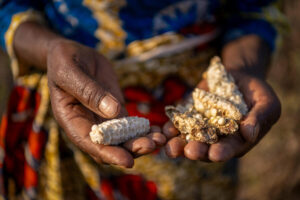The article originally published by the World Food Programme (WFP) and republished by All Africa and Relief Web calls for urgent funds to expand irrigation projects as communities across Southern Africa reel from El Niño. The story quotes Jan Duchoslav and Joachim De Weerdt (IFPRI Malawi) on the food security crisis in the country and the region.

“In March, Malawi joined Zambia and Zimbabwe in declaring a state of disaster after El Niño – the natural phenomenon that disrupts rainfall patterns around the Indian and Pacific oceans – exacerbated weather irregularities caused by climate change, leaving the country’s soils abnormally dry.” (…)
““We can avert a hunger catastrophe for the hardest-hit families… but time is not on our side,” Paul Turnbull, Country Director for the World Food Programme in Malawi. “In the middle of 2023-24 lean season, we found nine out of ten Malawian families were indulging in some sort of negative coping mechanism – adults not eating so their children could eat, people selling things they would normally use for productive purposes. Now we are seeing a surge in cases of moderate and severe acute malnutrition at the health centres.”
Jan Duchoslav and Joachim De Weerdt, research fellows for the International Food Policy Research Institute office in Malawi’s capital, Lilongwe, echo Turnbull’s concerns. “People are going hungry already. This should be the season of plenty but food is running out. There’s evidence that people’s ability to deal with these things has been eroded over time.” (…)
“The yin to El Niño’s yang is La Niña, which “tends to bring above-average rainfall to Southern Africa”, say Duchoslav and De Weerdt. Could this be a cause for hope?
“Not in the short term” – there are eight months to go before the next harvest. “People can’t wait. A hungry child will be stunted in both their physical and cognitive development.”
A good harvest is also dependent on a farmer’s ability to make investments during planting season. “If people are already economically stressed, they won’t be able to invest in this year’s production, so even if the rains are good, the harvest might not be.” (…)
“Working out a regional response is key, say Duchoslav and De Weerdt: “Usually, a local crisis gets solved through trade, but the whole region is suffering. It’s a very special situation and ideally food should be brought in from outside the region.”
As for the Government’s role, “macroeconomic pressure makes it hard to spend on imports… dollars need to come from somewhere. Realistically, the only place they can come from is international donors.”
Read the full story on WFP.org



